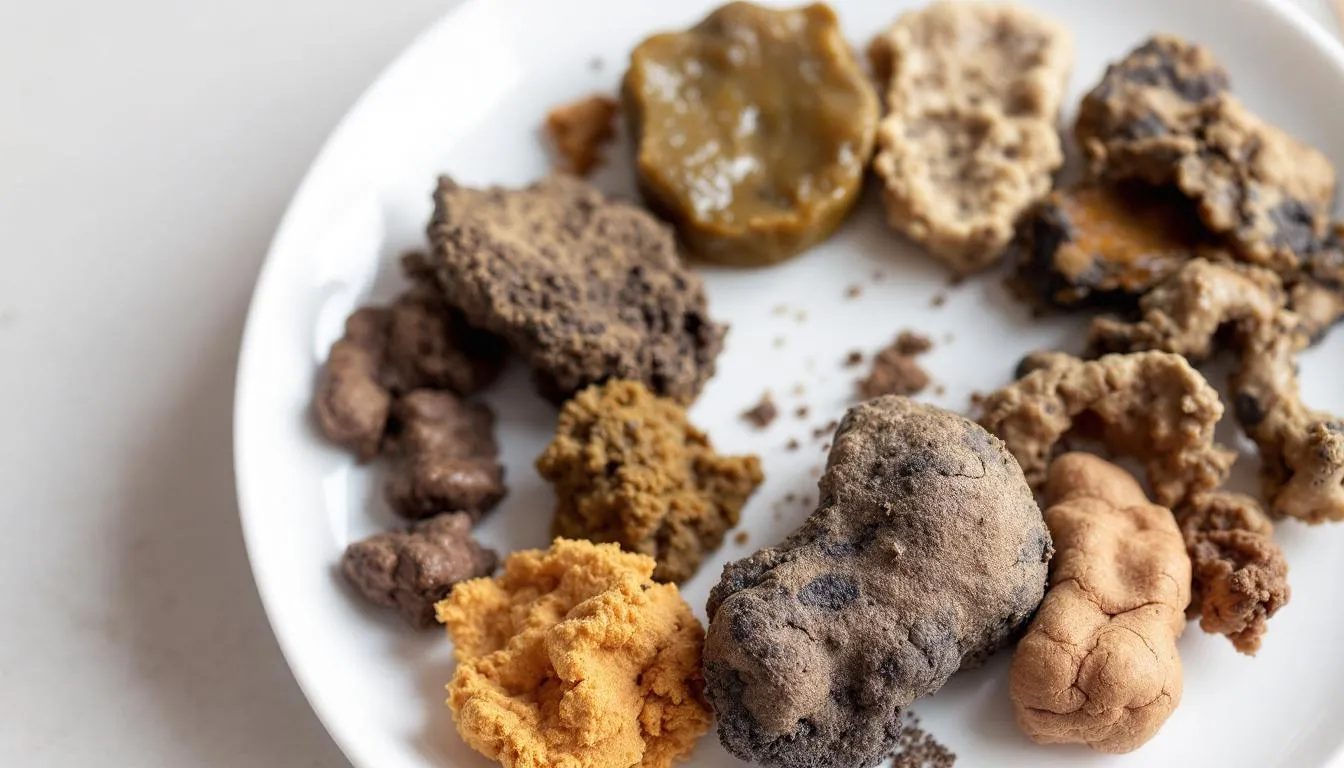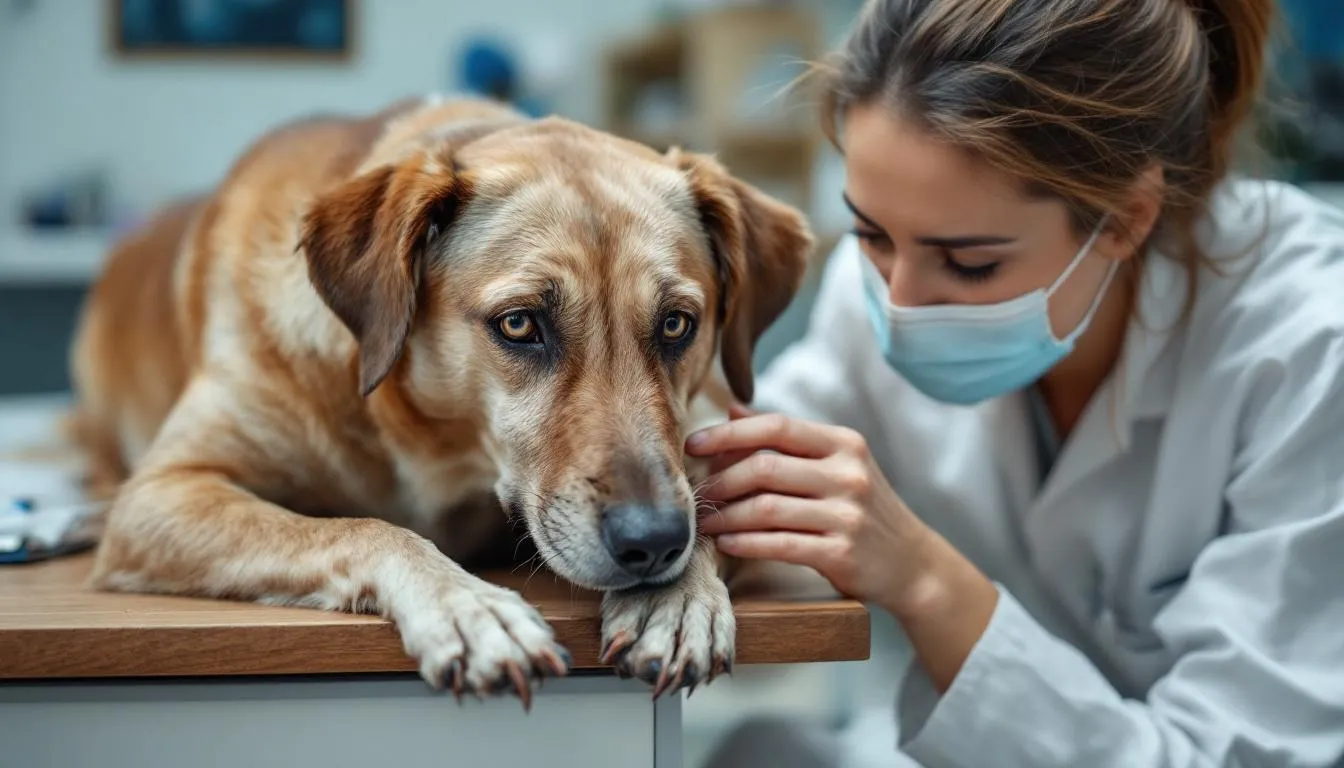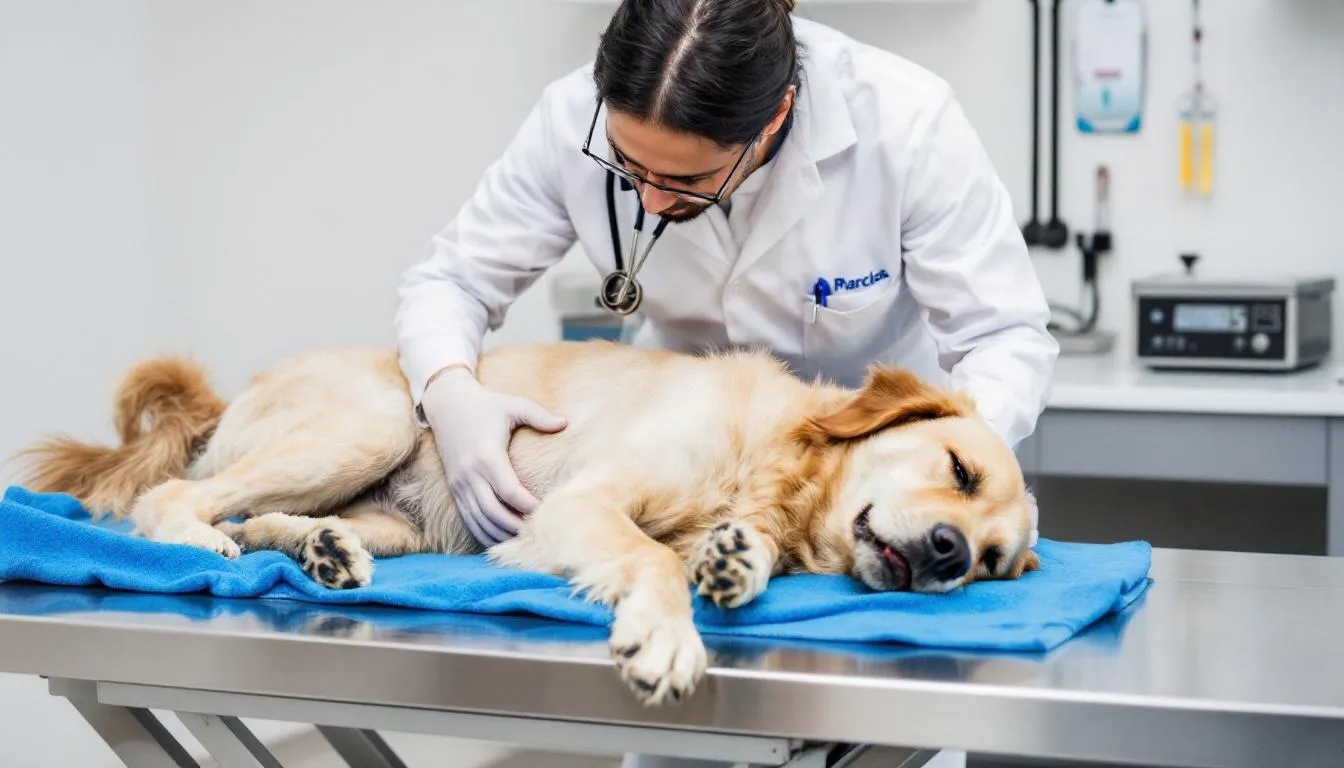

Key Takeaways
Diarrhea in dogs can range from mild dietary upset to serious medical emergencies requiring immediate veterinary care
- Diarrhea in dogs can range from mild dietary upset to serious medical emergencies requiring immediate veterinary care
- Common causes include dietary indiscretion, sudden food changes, parasites, infections, and stress-related factors
- Blood in stool, chronic diarrhea lasting over 2-3 days, or accompanying symptoms like vomiting and lethargy warrant immediate vet attention
- Home treatment includes 12-24 hour fasting for adult dogs followed by bland diet of boiled chicken and rice
- Never give human medications like Imodium or Pepto Bismol to dogs without veterinary approval as they can be toxic
Common causes include dietary indiscretion, sudden food changes, parasites, infections, and stress-related factors
Blood in stool, chronic diarrhea lasting over 2-3 days, or accompanying symptoms like vomiting and lethargy warrant immediate vet attention
Home treatment includes 12-24 hour fasting for adult dogs followed by bland diet of boiled chicken and rice
Never give human medications like Imodium or Pepto Bismol to dogs without veterinary approval as they can be toxic
Every pet parent has experienced that sinking feeling when discovering their canine companion has developed loose stools. While dog diarrhea is one of the most common health concerns affecting our four-legged family members, it can range from a minor dietary upset to a very serious health issue requiring immediate medical intervention. Understanding when your dog’s diarrhea represents a manageable situation versus a potential emergency can make the difference in your pet’s health and recovery.
This comprehensive guide will help you navigate the complexities of diarrhea in dogs, from identifying underlying causes to implementing appropriate treatment strategies. Whether you’re dealing with a single episode of mild intestinal distress or persistent diarrhea that has you concerned, you’ll learn to recognize warning signs, provide effective home care when appropriate, and understand when veterinary attention becomes essential.
Understanding Dogs and Diarrhea
Diarrhea in dogs is defined as the passage of loose, watery, or unformed stools that occur more frequently than your dog’s normal bowel movements. Unlike the occasional soft stool that might result from excitement or minor dietary changes, true diarrhea represents a disruption in your dog’s digestive system that prevents proper water absorption in the intestines.
The condition manifests in two primary forms that require different approaches. Acute diarrhea develops suddenly and typically lasts between one to fourteen days, often resolving with appropriate care and dietary management. Chronic diarrhea, however, persists for more than fourteen days and usually indicates an underlying medical condition requiring professional diagnosis and treatment.
When your dog’s digestive system functions normally, the intestines absorb water and nutrients efficiently, producing well-formed stools. Diarrhea occurs when this absorptive capacity becomes compromised due to inflammation, infection, or other dysfunction, leaving excess water in the stool. This process can quickly lead to dehydration and electrolyte imbalances, particularly concerning in puppies, senior dogs, or pets with a compromised immune system.
Understanding that your dog’s diarrhea is a symptom rather than a disease itself helps frame the importance of identifying and addressing the root cause. While many episodes resolve without intervention, persistent or severe cases require careful evaluation to prevent serious complications and ensure your pet’s long-term digestive health.


Common Causes of Diarrhea in Dogs
Multiple factors can trigger diarrhea in dogs, ranging from simple dietary mistakes to complex medical conditions. Identifying the likely cause helps determine whether home treatment is appropriate or if your canine companion requires professional veterinary care.
Dietary Causes
Dietary indiscretion represents one of the most frequent culprits behind acute diarrhea episodes. Dogs suffering from this condition have typically consumed something inappropriate, such as spoiled food from garbage cans, rich table scraps, or non-food items during walks. Even well-intentioned treats like fatty human food can overwhelm your dog’s digestive system, leading to an upset tummy and loose stools.
Sudden changes in your dog’s diet without proper transition periods can disrupt the delicate balance of gut bacteria, resulting in digestive upset. When switching dog foods, the recommended approach involves gradually mixing increasing amounts of the new food with decreasing amounts of the old over seven to ten days. This allows your dog’s digestive system to adapt to new ingredients and prevents unnecessary stomach upset.
Food allergies and food intolerance also contribute to recurring digestive issues. While true food allergies are less common than many pet parents believe, they can cause chronic diarrhea alongside other symptoms like skin irritation. Food intolerance, particularly to dairy products or specific proteins, may develop over time and requires careful dietary management to identify triggering ingredients.
Table scraps, while tempting to share with your beloved pet, often contain ingredients that can cause gastrointestinal discomfort. Foods high in fat, spices, or artificial additives can overwhelm your dog’s stomach and lead to loose stools or more severe digestive upset.
Infectious Causes
Bacterial infections from pathogens like Salmonella and Campylobacter can cause severe diarrhea, often accompanied by fever and systemic illness. These infections typically occur through contaminated food sources or exposure to infected animals, making proper food handling and hygiene essential for prevention.
Viral infections disrupt normal gut flora and can cause watery diarrhea, particularly in young or immunocompromised dogs. Parvovirus, one of the most serious viral infections affecting dogs, causes devastating intestinal damage and requires immediate emergency veterinary attention due to its high mortality rate in untreated cases.
Internal parasites including roundworms, hookworms, whipworms, and Giardia represent a major global cause of diarrhea in dogs. These intestinal parasites interfere with normal digestion and absorption while irritating the intestinal lining. Regular parasite prevention and routine fecal examinations help identify and treat these infections before they cause serious health complications.
The transmission of parasites often occurs through contaminated environments, infected prey, or contact with other animals carrying these organisms. Young puppies are particularly susceptible due to their developing immune systems and higher likelihood of exposure through their mothers or littermates.
Medical Conditions
Inflammatory bowel disease causes chronic intestinal inflammation that leads to persistent digestive symptoms including recurring diarrhea, weight loss, and poor appetite. This condition requires specialized diagnostic testing and long-term management with specially formulated dog foods and potentially immunosuppressive medications.
Non-gastrointestinal diseases frequently manifest with digestive symptoms. Liver disease and kidney disease can both cause diarrhea as these organs play crucial roles in processing waste products and maintaining metabolic balance. When these systems become compromised, toxins can accumulate and irritate the digestive tract.
Pancreatitis, or inflammation of the pancreas, significantly impairs digestion and frequently causes severe diarrhea along with vomiting and abdominal pain. This condition often develops after dogs consume high-fat meals and requires immediate veterinary intervention to prevent life-threatening complications.
Medications prescribed for other conditions, particularly antibiotics, can disrupt normal gut bacteria and lead to secondary diarrhea. While these medications may be necessary for treating infections, they can eliminate beneficial bacteria that maintain healthy digestion, sometimes leading to overgrowth of harmful organisms.
Stress and anxiety from boarding, traveling, or environmental changes can trigger digestive upset even in healthy dogs. The connection between emotional stress and gastrointestinal function is well-established, with stress hormones directly affecting intestinal function and bacterial balance.
Types of Diarrhea in Dogs
Understanding the different types of diarrhea helps veterinarians determine the most likely location and cause of your dog’s digestive upset, leading to more targeted and effective treatment approaches.
Small-bowel diarrhea typically produces large volumes of watery stool with minimal blood or mucus. This type often results from infections, dietary indiscretion, or malabsorption issues affecting the small intestine where most nutrient absorption occurs. Dogs with small-bowel diarrhea may have more frequent bowel movements but usually maintain relatively normal urgency and control.
Large-bowel diarrhea presents differently, with smaller volumes of stool that frequently contain blood, mucus, or both. This type often causes increased urgency and may result in accidents as dogs struggle to control their bowel movements. Conditions affecting the colon, such as inflammatory bowel disease or certain parasites, typically cause this presentation.
The appearance, frequency, and accompanying symptoms of your dog’s stool provide valuable diagnostic information. Bright red blood indicates bleeding in the lower digestive tract, while dark, tarry stools suggest bleeding higher in the system. Mucus-covered stools often indicate inflammation, while yellow or clay-colored stools might suggest liver-related issues.
Documenting these characteristics helps your veterinarian assess the severity and likely cause of your pet’s condition. Taking photos of concerning stools, while unpleasant, can provide valuable diagnostic information during veterinary consultations, especially if the diarrhea has resolved by the time of examination.


When Diarrhea Becomes an Emergency
Recognizing when your dog’s diarrhea requires immediate veterinary attention can prevent serious complications and potentially save your pet’s life. Several warning signs indicate that home treatment is insufficient and professional medical intervention becomes necessary.
Blood in your dog’s stool represents a significant concern requiring prompt veterinary evaluation. Bright red blood (hematochezia) indicates bleeding in the lower digestive tract, while dark, tarry stools (melena) suggest bleeding higher in the system, potentially from the stomach or small intestine. Both presentations warrant immediate veterinary attention as they may indicate serious underlying conditions.
Signs of dehydration develop rapidly during severe diarrhea episodes and represent a life-threatening emergency. Watch for lethargy, sticky gums, reduced skin elasticity (skin that tents when pinched), sunken eyes, and decreased urination. These symptoms indicate your dog’s body is losing fluids faster than they can be replaced, requiring immediate professional intervention to prevent organ failure.
Chronic diarrhea persisting for more than two to three days requires veterinary evaluation regardless of your dog’s overall condition. While some cases may appear mild, persistent digestive upset often indicates underlying medical conditions that require professional diagnosis and treatment to prevent long-term complications.
When your dog’s diarrhea persists alongside other symptoms such as repeated vomiting, complete loss of appetite, abdominal pain, fever, or significant lethargy, immediate veterinary care becomes essential. These combinations suggest systemic illness rather than simple digestive upset and may indicate serious conditions requiring urgent intervention.
Special considerations apply to puppies, senior dogs, and pets with compromised immune systems. These vulnerable populations can deteriorate rapidly during diarrheal episodes and may require professional evaluation even for symptoms that might be manageable in healthy adult dogs. When in doubt, contacting your veterinarian for guidance provides the safest approach for these high-risk pets.


Home Treatment for Mild Diarrhea
Appropriate home treatment can effectively manage mild diarrhea episodes in healthy adult dogs, but understanding when this approach is suitable versus when professional care is needed ensures your pet’s safety and recovery.
Fasting Protocol
A controlled fasting period allows your dog’s digestive system to rest and reset, often providing significant relief for mild intestinal distress. Adult dogs can safely fast for 12-24 hours while maintaining access to fresh water. This approach helps reduce intestinal irritation and allows inflammation to subside naturally.
However, fasting protocols require careful consideration based on your dog’s age, size, and health status. Puppies under six months, small breed dogs, and pets with diabetes or other medical conditions should not fast without specific veterinary guidance. These animals have higher metabolic rates and lower energy reserves, making extended fasting potentially dangerous.
During the fasting period, monitor your dog’s condition closely for signs of improvement or deterioration. Continued access to fresh water remains essential to prevent dehydration, but food should be completely withheld for the designated period. If your dog’s condition worsens during fasting or if new symptoms develop, discontinue the fast and seek veterinary care immediately.
Bland Diet Approach
Following the fasting period, gradually reintroduce food using a bland diet that minimizes digestive irritation while providing essential nutrients. The most commonly recommended combination consists of boiled chicken (skinless and boneless) mixed with plain cooked white rice in a ratio of approximately one part chicken to two parts rice.
Canned plain pumpkin (not pumpkin pie filling, which contains harmful spices and additives) can be added to provide beneficial fiber that helps normalize stool consistency. Start with small amounts, roughly one tablespoon per 10 pounds of body weight, mixed with the chicken and rice. The natural fiber in pumpkin helps absorb excess water while supporting healthy digestion.
Peeled boiled potatoes serve as an alternative carbohydrate source for dogs with rice sensitivities. These should be prepared plain without any seasonings, butter, or additives that could worsen digestive upset. The goal is providing easily digestible energy while minimizing ingredients that might trigger further intestinal irritation.
Feed smaller, more frequent meals during the recovery period rather than large portions that might overwhelm your dog’s healing digestive system. Offer quarter-sized portions every few hours initially, gradually increasing meal size and decreasing frequency as your dog’s stool firms up and returns to normal consistency.
The gradual reintroduction of your dog’s regular food should occur over three to five days, slowly replacing portions of the bland diet with increasing amounts of their normal dog food. This transition period prevents relapse and allows the digestive system to readjust to regular nutrition.
Supportive Care Measures
Probiotics specifically formulated for dogs can help restore healthy gut bacteria balance disrupted during diarrheal episodes. These beneficial microorganisms support normal digestion and can significantly reduce the duration and severity of digestive upset. Choose veterinary-approved products rather than human probiotics, which may not provide appropriate bacterial strains for canine digestive systems.
Natural yogurt with live cultures may provide similar benefits, but should only be offered if your dog tolerates dairy products well. Many dogs are lactose intolerant, making yogurt potentially counterproductive for digestive recovery. When in doubt, stick with specifically formulated canine probiotics.
Creating a calm, stress-free environment supports your dog’s recovery by minimizing anxiety-related digestive upset. Maintain normal routines as much as possible while providing comfortable resting areas and avoiding unnecessary excitement or activity that might worsen symptoms.
Monitor your dog’s stool quality, frequency, and overall demeanor throughout the treatment period. Improvement should be evident within 24-48 hours of beginning bland diet therapy. If symptoms persist, worsen, or new concerning signs develop, discontinue home treatment and consult your veterinarian promptly.
What NOT to Give Dogs with Diarrhea
Understanding which substances to avoid during your dog’s digestive upset is crucial for preventing dangerous complications and ensuring safe recovery. Many well-intentioned treatments can actually worsen your pet’s condition or cause serious health problems.
Human medications including Imodium, Pepto Bismol, and other over-the-counter medications should never be given to dogs without explicit veterinary approval. These drug human medications can be toxic to dogs and may mask important symptoms that veterinarians need to assess underlying conditions. Imodium, for example, can cause severe reactions in certain dog breeds and may worsen some types of diarrhea by preventing the elimination of toxins or infectious agents.
The temptation to use familiar human remedies often stems from a desire to provide immediate relief, but dogs metabolize medications differently than humans. What seems like a safe, familiar treatment can cause liver damage, central nervous system depression, or other serious complications in canine patients.
Dairy products should be avoided as most adult dogs are lactose intolerant and cannot properly digest milk sugars. Offering milk, cheese, or ice cream to a dog with digestive upset often worsens diarrhea and can cause additional gastrointestinal discomfort. Even dogs that normally tolerate small amounts of dairy may react poorly when their digestive systems are already compromised.
High-fat foods including fatty meats, fried foods, and rich treats can overwhelm an already stressed digestive system and potentially trigger pancreatitis. The dog’s stomach cannot efficiently process these complex foods during recovery, and the additional fat content may worsen diarrhea or cause vomiting.
High-fiber vegetables and fruits, while healthy for normal dogs, can increase digestive irritation during diarrheal episodes. Foods like broccoli, cabbage, and beans may cause gas and further intestinal upset when the digestive tract is inflamed or sensitive.


Veterinary Diagnosis and Treatment
Professional veterinary evaluation becomes necessary when home treatment fails to resolve your dog’s symptoms or when concerning signs develop. Understanding what to expect during veterinary assessment helps you prepare and ensures comprehensive care for your canine companion.
Physical examination procedures focus on assessing your dog’s overall condition and identifying signs of dehydration, pain, or systemic illness. Your veterinarian will check vital signs, examine the abdomen for tenderness or abnormal findings, and evaluate hydration status through skin elasticity tests and mucous membrane color. This hands-on assessment provides crucial information about the severity of your pet’s condition.
Diagnostic tests may include stool samples to identify parasites, bacteria, or other infectious agents causing your dog’s symptoms. Blood work helps evaluate organ function, detect signs of infection or inflammation, and assess electrolyte balance. In some cases, X-rays or ultrasound examinations may be necessary to rule out intestinal obstructions, foreign bodies, or structural abnormalities.
The diagnostic approach varies based on your dog’s symptoms, duration of illness, and physical examination findings. Your veterinarian may recommend immediate testing for severe cases or suggest monitoring with supportive care for mild presentations. Providing detailed information about your pet’s symptoms, recent activities, and any treatments you’ve attempted helps guide the diagnostic process.
Treatment options range from supportive care and dietary management to specific medications prescribed based on identified causes. Anti-diarrheal medications may be appropriate in certain situations, but these are prescription products designed for dogs rather than human formulations. Antibiotics are reserved for confirmed bacterial infections, as unnecessary antibiotic use can worsen diarrhea by further disrupting normal gut bacteria.
Specially formulated dog foods designed for digestive health may be recommended for dogs with chronic or recurring digestive issues. These prescription diets contain easily digestible ingredients, appropriate fiber levels, and sometimes beneficial additives that support intestinal healing and normal function.
Severe cases may require hospitalization for intravenous fluid therapy, injectable medications, and intensive monitoring. This level of care becomes necessary when dogs develop significant dehydration, persistent vomiting, or signs of systemic illness that cannot be managed on an outpatient basis.
Prevention Strategies
Preventing diarrhea episodes protects your dog’s health and comfort while avoiding the stress and expense of treating digestive problems. Implementing comprehensive prevention strategies addresses the most common causes and reduces your pet’s risk of developing serious complications.
Proper diet management forms the foundation of digestive health prevention. Maintain consistent feeding schedules with high-quality dog food appropriate for your pet’s age, size, and activity level. When changing dog foods becomes necessary, implement gradual transitions over seven to ten days, slowly increasing new food portions while decreasing old food amounts. This approach allows your dog’s digestive system to adapt without triggering upset.
Regular parasite prevention through monthly preventatives protects against intestinal parasites that commonly cause diarrhea in dogs. These medications target roundworms, hookworms, whipworms, and other parasites before they can establish significant infections. Combining preventative medications with routine fecal examinations during veterinary visits ensures comprehensive parasite control.
Preventing dietary indiscretion requires consistent supervision and training to discourage inappropriate eating behaviors. Use secure garbage cans, avoid leaving food scraps accessible, and teach reliable “leave it” commands to prevent your dog eating dangerous or inappropriate items during walks or outdoor activities. Training these behaviors early prevents many emergency situations and protects your pet’s long-term health.
Stress management techniques help minimize anxiety-related digestive upset, particularly during unavoidable stressful situations like boarding, traveling, or environmental changes. Gradual exposure to new situations, maintaining familiar routines when possible, and providing comfort items can reduce your dog’s stress response and associated digestive symptoms.
Regular veterinary check-ups enable early detection and treatment of underlying health conditions that might predispose your dog to digestive problems. Maintaining current vaccinations protects against viral infections that can cause severe diarrhea, while routine blood work can identify developing liver disease, kidney disease, or other systemic conditions before they cause symptoms.
Maintaining a clean living environment reduces exposure to infectious agents and contaminated materials that might trigger digestive upset. Regular cleaning of food and water bowls, prompt removal of waste from living areas, and avoiding contact with obviously ill animals helps minimize disease transmission.
FAQ
How long should I wait before calling my vet if my dog has diarrhea?
For healthy adult dogs, you can try home treatment for 24-48 hours if the diarrhea is mild and your dog remains alert and eating. However, contact your veterinarian immediately if you notice blood in the stool, signs of dehydration, persistent vomiting, or if your dog becomes lethargic. Puppies, senior dogs, and those with compromised immune systems should be evaluated sooner, often within 12-24 hours of symptom onset.
Can stress alone cause diarrhea in dogs, and how can I manage it?
Yes, stress and anxiety can definitely trigger diarrhea in dogs through the gut-brain connection. Common stressors include boarding, moving, new pets, schedule changes, or loud noises. To manage stress-related digestive issues, maintain consistent routines, provide safe spaces, use calming aids like pheromone diffusers, and gradually introduce changes when possible. If stress-related diarrhea becomes chronic, consult your veterinarian about anti-anxiety treatments.
Is it normal for puppies to have diarrhea more frequently than adult dogs?
Puppies do experience digestive upset more frequently due to their developing immune systems, tendency to eat inappropriate items, and sensitivity to dietary changes. However, diarrhea in puppies should never be considered “normal” and requires more urgent attention than in adult dogs. Puppies can become dehydrated quickly and are more susceptible to serious infections like parvovirus, so any persistent diarrhea warrants prompt veterinary evaluation.
What’s the difference between food allergies and food intolerances in dogs?
Food allergies involve an immune system response to specific proteins and typically cause symptoms like skin irritation, itching, and chronic digestive issues. True food allergies are relatively uncommon in dogs. Food intolerance, on the other hand, occurs when dogs cannot properly digest certain ingredients (like lactose in dairy products) and usually causes immediate digestive upset without immune system involvement. Food intolerance symptoms are typically limited to gastrointestinal signs and resolve once the offending ingredient is removed.
Can changing my dog’s water source cause diarrhea when traveling?
Yes, sudden changes in water sources can potentially cause digestive upset in sensitive dogs, similar to how travel affects some people. Different mineral content, pH levels, or bacterial populations in new water sources may trigger mild diarrhea. To prevent this, consider bringing familiar water from home for the first few days of travel, or gradually transition to local water by mixing it with familiar water. Most dogs adapt quickly, but those with sensitive stomachs may benefit from bottled water during travel.
FAQ
How long should I wait before calling my vet if my dog has diarrhea?
For healthy adult dogs, you can try home treatment for 24-48 hours if the diarrhea is mild and your dog remains alert and eating. However, contact your veterinarian immediately if you notice blood in the stool, signs of dehydration, persistent vomiting, or if your dog becomes lethargic. Puppies, senior dogs, and those with compromised immune systems should be evaluated sooner, often within 12-24 hours of symptom onset.
Can stress alone cause diarrhea in dogs, and how can I manage it?
Yes, stress and anxiety can definitely trigger diarrhea in dogs through the gut-brain connection. Common stressors include boarding, moving, new pets, schedule changes, or loud noises. To manage stress-related digestive issues, maintain consistent routines, provide safe spaces, use calming aids like pheromone diffusers, and gradually introduce changes when possible. If stress-related diarrhea becomes chronic, consult your veterinarian about anti-anxiety treatments.
Is it normal for puppies to have diarrhea more frequently than adult dogs?
Puppies do experience digestive upset more frequently due to their developing immune systems, tendency to eat inappropriate items, and sensitivity to dietary changes. However, diarrhea in puppies should never be considered “normal” and requires more urgent attention than in adult dogs. Puppies can become dehydrated quickly and are more susceptible to serious infections like parvovirus, so any persistent diarrhea warrants prompt veterinary evaluation.
What’s the difference between food allergies and food intolerances in dogs?
Food allergies involve an immune system response to specific proteins and typically cause symptoms like skin irritation, itching, and chronic digestive issues. True food allergies are relatively uncommon in dogs. Food intolerance, on the other hand, occurs when dogs cannot properly digest certain ingredients (like lactose in dairy products) and usually causes immediate digestive upset without immune system involvement. Food intolerance symptoms are typically limited to gastrointestinal signs and resolve once the offending ingredient is removed.
Can changing my dog’s water source cause diarrhea when traveling?
Yes, sudden changes in water sources can potentially cause digestive upset in sensitive dogs, similar to how travel affects some people. Different mineral content, pH levels, or bacterial populations in new water sources may trigger mild diarrhea. To prevent this, consider bringing familiar water from home for the first few days of travel, or gradually transition to local water by mixing it with familiar water. Most dogs adapt quickly, but those with sensitive stomachs may benefit from bottled water during travel.






